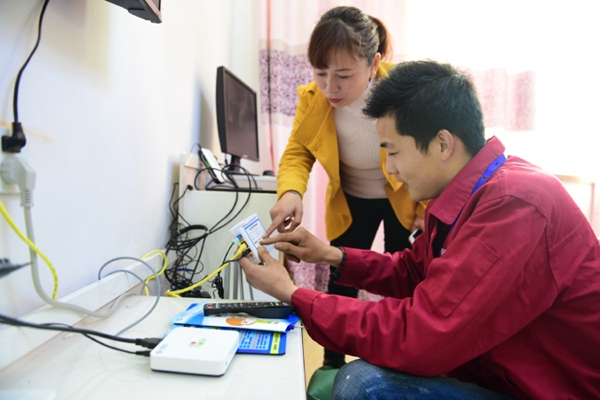Internet coverage improves significantly across rural areas in last five years
 0 Comment(s)
0 Comment(s) Print
Print E-mail Beijing Review, November 26, 2020
E-mail Beijing Review, November 26, 2020

In Xiqianbo, a village in Suning, a county in Hebei province in north China, Chen Lei, secretary of the village's Communist Party of China branch, has been guiding villagers to sell their fishing rods online since 2014.
In 2017, the total sales of the villagers' stores on Taobao, an online business platform owned by e-commerce giant Alibaba, surpassed 10 million yuan ($1.5 million). That year, the village was recognized as a Taobao Village by AliResearch, Alibaba's research institute.
To become a Taobao Village, a rural community must feature more than 100 active online stores, or more than 10 percent of households participating in e-commerce. Additionally, it must generate total annual sales of at least 10 million yuan ($1.52 million).
Nowadays, hundreds of thousands of fishing rods are sold by the village online every day. In September, an e-commerce service center was established, providing free e-commerce training for villagers from Xiqianbo as well as nearby villages. Next to the center is a live-streaming industrial park constructed by the Suning government. Every day, the site sees more than 50 farmer hosts live-stream selling their fishing rods by the pond.
Suning began to develop the fishing tool industry back in the 1990s, and it has become a major production and sales hub for fishing tools.
"In the past, villagers used to work as migrant workers in cities, making few thousand yuan a month. Now they can earn up to 10 times more by selling fishing rods online in their hometown," Chen told Beijing-based weekly Oriental Outlook.
As more villagers open Taobao stores, WiFi and logistical circumstances, too, have improved. The village struck a deal with a local telecom company to upgrade overall Internet services for villagers, enabling them to access fiber-optic networks. It has also negotiated with express delivery companies for couriers to come and collect parcels every day.
As of June 2020, there were more than 5,425 Taobao Villages, accounting for 1 percent of all villages in China and creating some 8.28 million jobs, the latest report of AliResearch revealed.
According to a research jointly conducted by AliResearch and Huang Jikun, a professor at the School of Advanced Agricultural Sciences at Peking University, the digital economy can help impoverished counties rid themselves of poverty and bridge the income gap between urban and rural areas.
Online retail sales of rural areas increased from 180 billion yuan ($27.4 billion) in 2014 to 1.7 trillion yuan ($258.9 billion) in 2019, an 8.4 times increase, according to a press conference on the digitalization of rural areas held on November 6.
E-commerce is just one aspect of how modern technologies are transforming rural economy. The application of big data and the Internet of Things to farming has also turned farming into a more scientific undertaking, saving time and labor.
In Xiqianbo, a village in Suning, a county in Hebei province in north China, Chen Lei, secretary of the village's Communist Party of China branch, has been guiding villagers to sell their fishing rods online since 2014.
In 2017, the total sales of the villagers' stores on Taobao, an online business platform owned by e-commerce giant Alibaba, surpassed 10 million yuan ($1.5 million). That year, the village was recognized as a Taobao Village by AliResearch, Alibaba's research institute.
To become a Taobao Village, a rural community must feature more than 100 active online stores, or more than 10 percent of households participating in e-commerce. Additionally, it must generate total annual sales of at least 10 million yuan ($1.52 million).
Nowadays, hundreds of thousands of fishing rods are sold by the village online every day. In September, an e-commerce service center was established, providing free e-commerce training for villagers from Xiqianbo as well as nearby villages. Next to the center is a live-streaming industrial park constructed by the Suning government. Every day, the site sees more than 50 farmer hosts live-stream selling their fishing rods by the pond.
Suning began to develop the fishing tool industry back in the 1990s, and it has become a major production and sales hub for fishing tools.
"In the past, villagers used to work as migrant workers in cities, making few thousand yuan a month. Now they can earn up to 10 times more by selling fishing rods online in their hometown," Chen told Beijing-based weekly Oriental Outlook.
As more villagers open Taobao stores, WiFi and logistical circumstances, too, have improved. The village struck a deal with a local telecom company to upgrade overall Internet services for villagers, enabling them to access fiber-optic networks. It has also negotiated with express delivery companies for couriers to come and collect parcels every day.
As of June 2020, there were more than 5,425 Taobao Villages, accounting for 1 percent of all villages in China and creating some 8.28 million jobs, the latest report of AliResearch revealed.
According to a research jointly conducted by AliResearch and Huang Jikun, a professor at the School of Advanced Agricultural Sciences at Peking University, the digital economy can help impoverished counties rid themselves of poverty and bridge the income gap between urban and rural areas.
Online retail sales of rural areas increased from 180 billion yuan ($27.4 billion) in 2014 to 1.7 trillion yuan ($258.9 billion) in 2019, an 8.4 times increase, according to a press conference on the digitalization of rural areas held on November 6.
E-commerce is just one aspect of how modern technologies are transforming rural economy. The application of big data and the Internet of Things to farming has also turned farming into a more scientific undertaking, saving time and labor.






Go to Forum >>0 Comment(s)